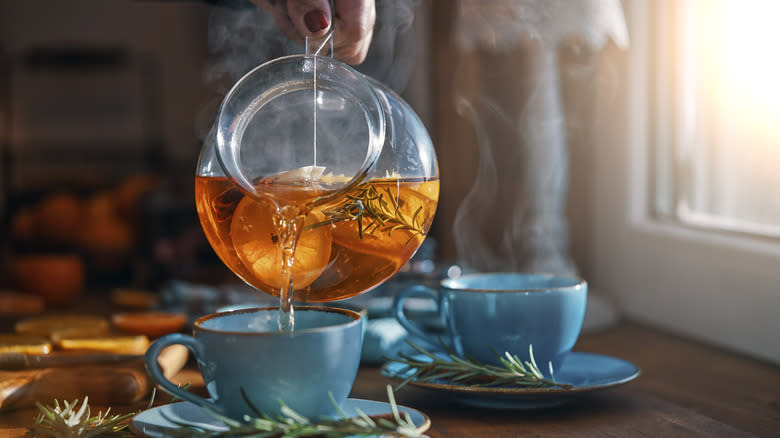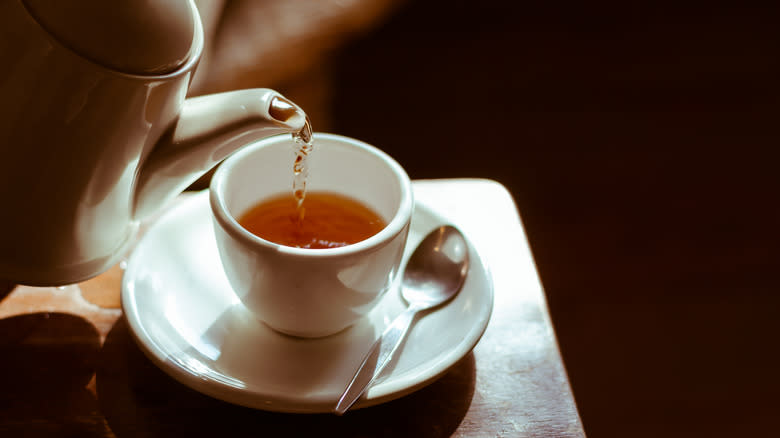What Are Tannins And What Do They Have To Do With Tea?

Tea is one of the most popular beverages around the world for a reason. It may essentially just be hot leaf juice, but it's an invigorating and refreshing drink perfect for a cold day (or any other day, for a lot of people). But tea isn't just popular for its caffeine content and flavor -- it's also popular for health reasons. You've probably heard about the benefits of drinking tea, like increased antioxidants and anti-inflammatory effects -- but where do those actually come from? The answer, it turns out, is tannins.
Tons of different foods have tannins -- coffee, chocolate, wine -- but why? If you're thinking they must be some chemical additive thrown in by big tea corporations, think again: Tannins are totally natural. They actually exist as a means for plants to protect themselves against pests. However, the negative effects tannins have on pests turn out to be beneficial to humans -- that is, most of the time. There are potential negatives to tannins, too.
Read more: The 15 Best Milk Brands, Ranked
Tannins Have All Sorts Of Beneficial Effects

Tannins belong to a class of chemical compounds called polyphenols, which exist in plants. Those antioxidant and anti-inflammatory effects aren't just talk; tannins really can have both effects, in addition to acting as a blood sugar regulator, according to a review in the journal Biomedicine & Pharmacotherapy. There are actually many different types of tannins; one of the main kinds found in green tea is called epigallocatechin gallate, and is thought to help protect against cellular damage and chronic illnesses such as heart disease, per Healthline. Theaflavins and thearubigins are other groups of tannins that are responsible for giving black tea its dark color, and are also thought to protect cells from damage from free radicals.
Black tea generally has the highest level of tannins, which is also why it has the most "tea-like" flavor, as tannins imbue foods with characteristic bitterness (for comparison, green tea generally has the least). Tannins also have the peculiar effect of reducing lubrication in the mouth; if you've ever thought tea or wine tasted "dry," one likely reason for that is tannins.
Tannins actually get their name from the leather goods industry. In addition to all of their other benefits, tannins have a coloring effect on whatever they're combined with; the compound was historically used to treat and dye animal hides to turn them into leather, per the U.S. Forest Service. Technically, this means that when you drink tea, you're sort of drinking ink.
Tannins Can Also Have Negative Effects

Unfortunately, not all of the effects of tannins are necessarily positive. Tannins can cause nausea if ingested on an empty stomach, for instance, as they may irritate your digestive tract, per Healthline. They can also mess with how your body absorbs iron, potentially contributing to conditions like anemia.
OK, but what about cancer? It turns out the answer here isn't nearly as straightforward. Per the journal Critical Reviews in Food Science and Nutrition, it's possible tannins either help cause cancer or help prevent it -- we don't actually know right now for certain. Tannins have also been reported to accelerate blood clotting, lower blood pressure, and trigger liver necrosis, among other negative effects, per a review in the International Journal of Pharmaceutical and Biological Science Archive. Many researchers have called for more studies on the compound, which highlights just how little we know about many of the foods we eat and their effects on our bodies.
So should you worry about tannins in tea? Probably not too much. The worst effects seem only to be associated with significant tannin consumption. WebMD recommends consuming no more than four or five cups of black tea per day. If you have sensitive digestion, you can neutralize some of the tannins by adding a splash of milk to your teacup or having some food with your drink. As with everything, moderation is key.
Read the original article on Daily Meal.

